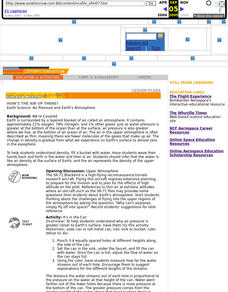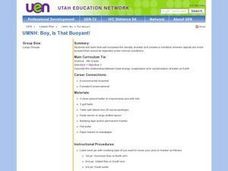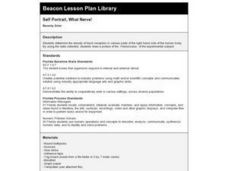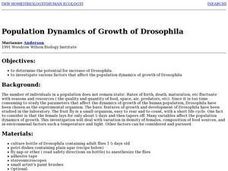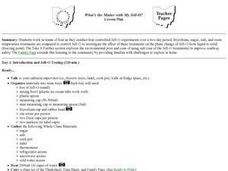Curated OER
Clouds, Winds, and Weather
Students observe, record, and report weather conditions to learn how air mass densities determine the weather we experience daily. They demonstrate how clouds form, name clouds and predict the weather.
Curated OER
Floating Soap
Students explore the density of soap. In this science lesson, students conduct an experiment to find which types of soap will float. Students make a hypothesis and record their observations.
Curated OER
Cactus Wheel
Students explore plant biology by conducting field experiments outside of class. In this desert plant instructional activity, students discuss how cacti thrive in such dry climates and how dense their populations are. Students utilize...
Curated OER
Hurricanes
Students state and directly experience two laws of Physics (Law of Gravity, Law of Centrifugal Force) that affect weather. They explain the observations made when using the "hurricane machine" and relate them to other events and phenomenon.
Curated OER
What's it Like Inside the Sun?
Learners perform experiment in which they model convection as it occurs in our Sun. They also explain that convection acts where the effect of gravity and heat are present (low density fluids can rise and cool, and high density fluids...
Curated OER
WHY DO SOME THINGS FLOAT WHILE OTHERS SINK
Young scholars explore how density can cause things to sink or float by experimenting with a jar, oil and corn syrup.
Curated OER
How's the Air Up There?
Students experiment with soda cans and water to discover why air pressure is greater closer to Earth's surface.
Curated OER
Icebergs Ahead!
Students experiment with density of ice, and examine how density affects how icebergs float in water.
Curated OER
Float My Boat
Fourth graders, in groups, experiment with density and the displacement of water by creating and designing their own boats and seeing which boat holds the most centimeter cubes without sinking..
Curated OER
Chesapeake Bay Population Studies
Students determine how to use a quarter meter quadrant to find population density, relative density, frequency and how to calculate a diversity index while participating in a virtual field trip. They study how to establish a Correlation...
Curated OER
Wind Dynamics and Forests
Students perform experiments to explore differences in wind speed and forest density. Through experimentation and observation, students realize that changes in vegetation affect the atmosphere and wind conditions. They create a model...
Curated OER
Boy, Is That Buoyant!
Fourth graders see that salt increases the density of water and creates a condition wherein objects are more buoyant than would be expected under normal conditions. They describe the relationship between heat energy, evaporation and...
Curated OER
Self Portrait, What Nerve!
Students conduct an experiment to determine the distance between touch receptor fields in parts of the right-hand side of the body. They enter data into the data table.
Curated OER
What is an Estuary?
Students define the terms estuary and watershed. They conduct an experiment to determine the density differences between fresh and saltwater. They examine the salinity distribution of the Peconic Bay Estuary.
Curated OER
Herb is the Word
Students conduct an experiment to determine how different soils affect plant growth over a six-week period. After determining the physical properties of different types of soil, students plant various types of seeds into the soil...
Curated OER
Science Lesson #2
Fourth graders explore and experiment with objects that float to see if they float differently in salt water or fresh water. After the experiment, they write a paragraph in their science journal explaining how fresh water and ocean water...
Curated OER
Detecting Magnetic Materials in "Martian" Soil
Students simulate some of the Pathfinder experiments by devising methods of collecting and measuring magnetic substances in pseudo-Martian soil. The efficiency of each of the methods used to collect materials is evaluated in this lesson.
Curated OER
Population Dynamics of Growth of Drosophila
Students experiment with Drosophila to determine if density of female flies, food sources, temperature and light affect the population dynamics of growth. Students graph their data and compare their results to the number of human...
Curated OER
Size Per Unit
Fifth graders investigate how to find the average and the concept of a per unit quantity and its applications. They also make connections of using population density and how to find the speed with its relating formula. This is bringing...
Curated OER
Changes Inside Planets
Pupils investigate the concept of planetary differentiation. They complete an experiment to simulate it using gelatin and food. The lesson includes vocabulary to increase reading comprehension skills as part of the inquiry. The lesson...
Curated OER
Bell Live! The Great Lakes: A Superior Adventure
Students participate in a virtual field trip to Lake Superior. In groups, they perform experiments in which test the level of toxins and bacteria in the water. They also watch video segments life in the lake and discuss their observations.
Curated OER
Emulsion_ Compulsion
Middle schoolers experiment with common household products to determine the properties of emulsions and how they fit into the classifications of matter through this series of lessons.
Curated OER
STABLE ANGLES OF SLOPES
Young scholars conduct an experiment using soil and shoeboxes to explore factors controlling and affecting the slope of a hillside. They analyze angles, surfaces, etc. to gain an understanding of instability of slopes.
Curated OER
What's the Matter with My Jell-o?
Young scholars work in teams of four as they conduct four controlled Jell-O experiments over a two-day period. The Family Page extends this learning to the community by providing families with challenges to explore at home.
Other popular searches
- Liquid Density Experiments
- Density Experiments Physics
- Solid Density Experiments
- Water Density Experiments
- Glycerin Density Experiments
- Metals Density Experiments
- Wood Density Experiments
- Matter Density Experiments
- Density Experiments Bread
- Gycerin Density Experiments
- Density Experiments Sugar
- Gas Density Experiments








